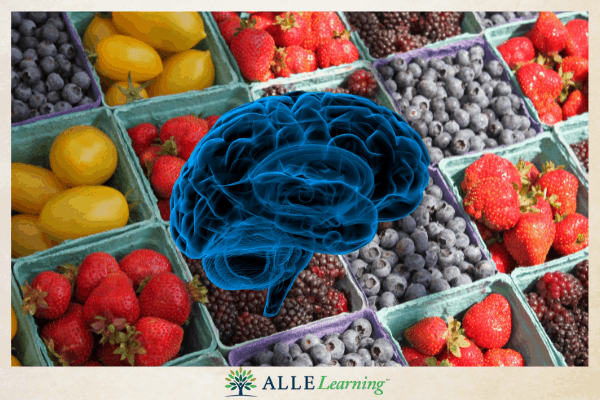Much of the discussion on how to help people with cognitive impairment involves medication. But plenty of research indicates that diet plays a part in maintaining a healthy brain.
A recent large-scale study published in the journal Neurology shows promising evidence that eating colorful fruits and vegetables—those with robust flavonoids, chemicals that create bright colors in foods—could help stave off subjective cognitive decline.
A New York Times article discussing the study notes, “The study was observational so cannot prove cause and effect, though its large size and long duration add to growing evidence that what we eat can affect brain health.” It followed 49,493 women from the Nurses’ Health Study (NHS) (1984-2006) and 27,842 men from the Health Professionals Follow-up Study (1986-2002). The average age of women was 76, and the average age of men was 73.
The study tracked the participants’ consumption of vibrant produce such as strawberries, carrots, and more, and concluded that the more flavonoids consumed, the fewer times people responded “yes” to seven questions about declining memory, lower ability to follow instructions, and trouble following a group conversation.
Of course, this is not new information; it’s just the largest-scale study of its kind. An article on the Mayo Clinic website cites a study of 16,000 older adults that showed “those who ate the most blueberries and strawberries had the slowest rates of cognitive decline.” The article also says eating less meat and more legumes may protect against cognitive decline, as might eating fish once or more a week.
This advice is echoed in an article on the Harvard Health Publishing website titled, “Foods linked to better brainpower.” It, too, suggests that eating fatty fish—or omega-3 supplements—are linked to fewer proteins that form clumps in the brains of those with Alzheimer’s disease. It also states, “A study done by researchers at Harvard's Brigham and Women's Hospital found that women who consumed two or more servings of strawberries and blueberries each week delayed memory decline by up to two-and-a-half years.” The article also relates that green, leafy vegetables; tea and coffee; and walnuts can possibly slow cognitive decline or improve memory skills.
ALLE Learning’s lifelong learning programs have been carefully devised to help brain health with interactions that provide engagement, interaction, and connection. If we can also improve cognitive abilities over time through healthier eating habits, it’s an important addition to the buffet of options for older adults in particular.
Learn more about the curriculum options offered to senior community centers by visiting Phoenix-based ALLE Learning™ at www.alle-learning.com, emailing us info@alle-learning.com, or calling us at (800) 990-9806. Learn about our related companies that focus on community-based curriculums, EngAGE EnCOURAGE,™ or our home-based classes for caregivers, Engaging at Home.

